West Hartford Arts and Cultural Organizations in Search of a Lifeline

Audio By Carbonatix
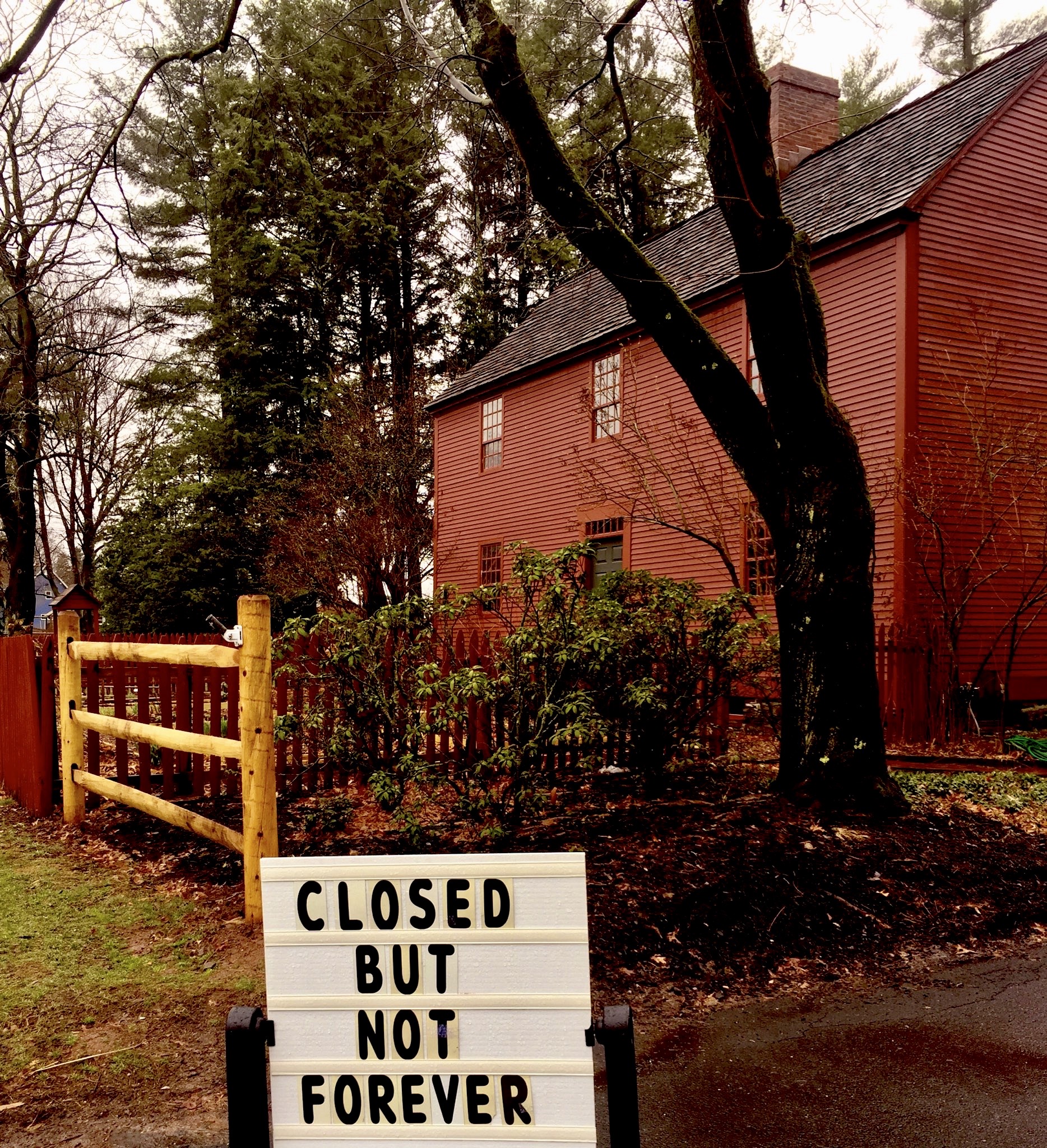
A sign of the times in mid March 2020. Courtesy of Noah Webster House & West Hartford Historical Society
A recent mandate from Gov. Ned Lamont requires non-essential businesses and schools to remain closed through May 20, and West Hartford’s arts and cultural organizations are struggling to survive without being able to hold programs or performances.
By Ronni Newton
Discussions were already underway in West Hartford to re-establish an arts and culture commission, to perhaps redesign the Mayor’s Charity Ball as a way to showcase the town’s vibrant organizations along with its diverse culinary offerings.
And then the COVID-19 pandemic hit.
One-by-one, stages went dark. Ballerinas were kept from the studios. Art continued, but with the options for sharing it publicly severely limited. Students were unable to visit museums or Noah Webster’s birthplace.
An entire spring of fundraisers, concerts, performances, and other events had to be scrapped, leaving many of West Hartford’s organizations struggling to survive.
Earlier this month, a letter was sent to West Hartford’s legislative delegation and signed by eight leaders of local arts and cultural organizations asking the state for help.
“West Hartford is a community rich in culture and arts. But in order to protect audiences, supporters, artists, and staff members from the spread of COVID-19 West Hartford’s arts and culture organizations have had no choice but to abruptly postpone and/or cancel many upcoming performances; place a halt on education including training classes, in-school/after-school programing, and community outreach; and delay season announcements, subscription renewals and critical fundraising events,” the letter reads in part. “The old adage states: ‘The show must go on,’ but for the first time in many of our lifetimes it is just not possible, not right now. To ensure that the show will go on again once this is over, West Hartford’s arts and culture organizations are asking for support from the State of Connecticut.”
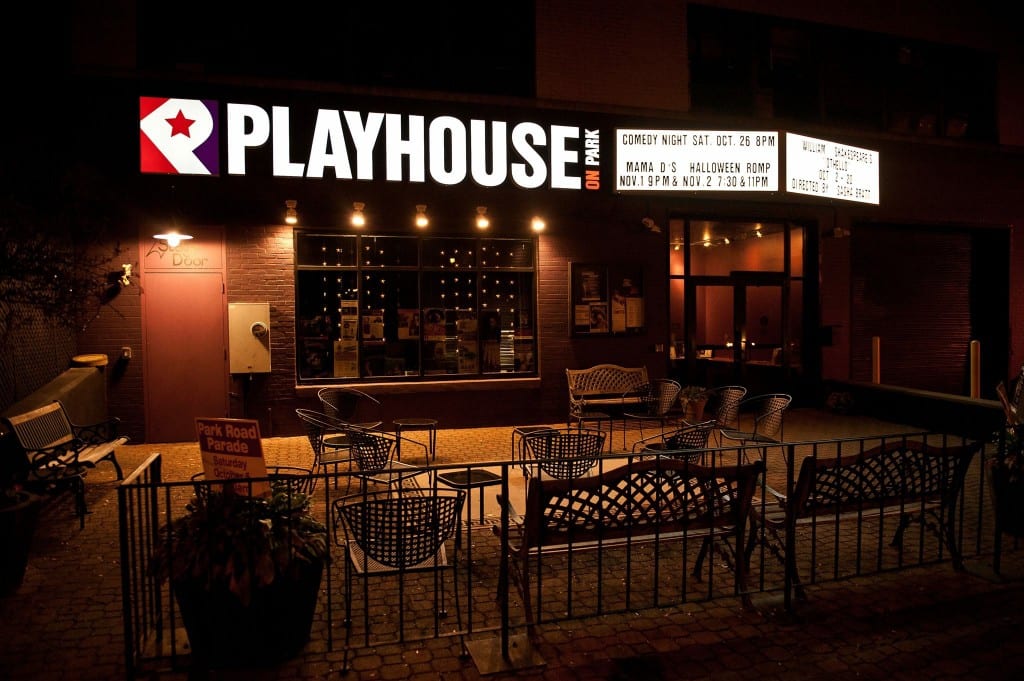
Playhouse on Park on Park Road in West Hartford. Photo credit: Cheyney Barrieau (we-ha.com file photo)
The letter was signed by Tracy Flater, executive director, Playhouse on Park; Stephanie Dattellas, artistic director, Ballet Theatre Company; Thomas Caraher, president, West Hartford Symphony Orchestra; Roxanne Stachelek, executive director, West Hartford Art League; Jennifer DiCola Matos, executive director, Noah Webster House & West Hartford Historical Society; Theresa Szymanski, president, West Hartford Community Theater; Beth Meehan, president, West Hartford Women’s Chorale; and Lori Solak, artistic director, Connecticut Family Theater.
What Mayor Shari Cantor hoped to see happen with a reinvigorated arts and culture commission – and what she hopes eventually will happen – is to have these organizations, and other arts and cultural organizations which play a critical role in the community, officially engage with the town’s economic development operations to develop strategy and an informational tool.
“There should be a calendar of events that links to our website,” Cantor said, so that events are coordinated and promoted. “We need them to be integrated into the structure of the town, really ingrained.”
The arts and cultural organizations that signed the letter – and several others from throughout the community – had already come together “when life was more normal,” to work together to plan the revamped Mayor’s Charity Ball, from which they would benefit, said Chuck Coursey, a West Hartford resident, former Council member, and public relations professional who had volunteered to help with the efforts.
Coursey said the intent was to enhance the Mayor’s Charity Ball, “to make it more inclusive, affordable, community minded, to get away from the expensive black tie format,” and the arts organizations were already beginning to work together on that effort.
“That was when the old world ended,” Coursey said. When businesses started shutting down, that’s when several of the organizations reached out to see what they could do together.
The needs are different – and some of the larger organizations like Playhouse on Park and Ballet Theatre Company have space that they rent year-round, full time employees, classes, and educational programs. “That all halted, but the expenses continue,” Coursey said.
Others, like the West Hartford Women’s Chorale, or the West Hartford Symphony, have fewer fixed costs outside of their performances, but without shows will take in very little revenue. “They’re all taking a hit, the West Hartford Art League is taking a hit, Connecticut Family Theater is taking a hit,” Coursey said.
There are a wide variety of arts organizations in West Hartford, said Flater, and for some the impact of shutting down is immediate. Playhouse on Park has significant overhead – rent, insurance, and a “hefty payroll to sustain.”
There is some funding made available – but just $450,000 to distribute to arts organizations all over the state, Flater said. The Hartford Foundation for Public Giving awards grants to nonprofits impacted by COVID-19, but to organizations that provide social services.
Flater said she has applied for the Paycheck Protection Program, which is one of the only programs available because the Playhouse doesn’t have collateral. As a nonprofit, taking out loans goes against everything she has ever learned as prudent management of a nonprofit. She is hoping that there will be additional grant money to take care of loan repayment.
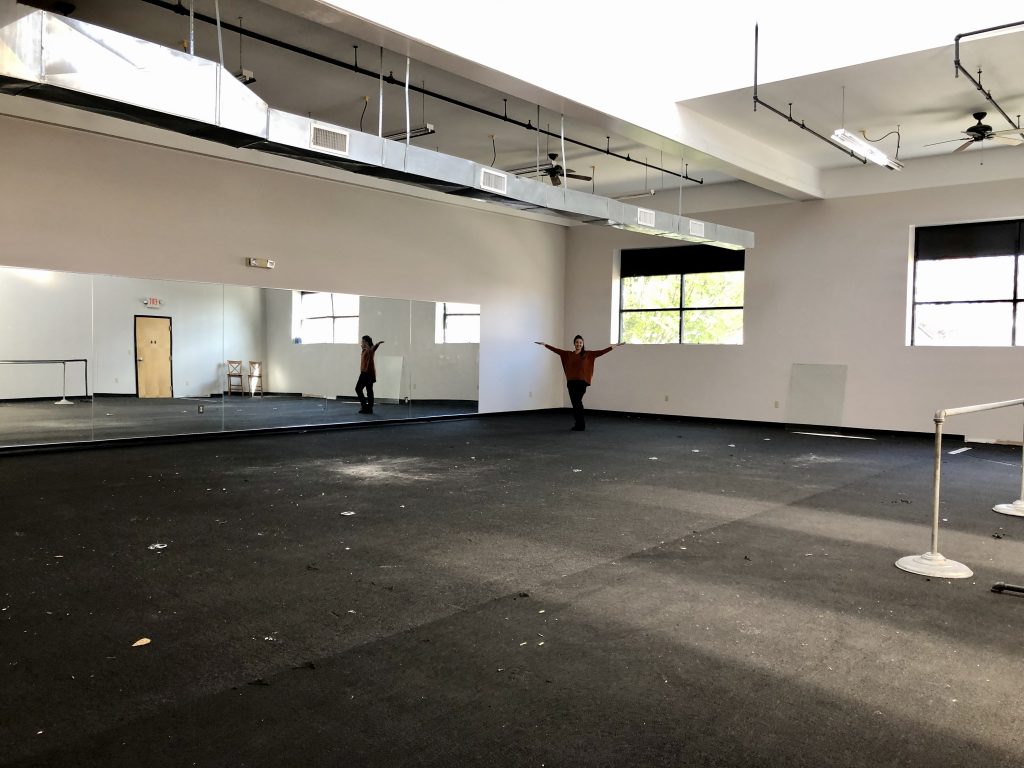
Ballet Theatre Company Artistic Director Stephanie Dattellas stands in the corner of what became additional space for the company in January. Photo credit: Ronni Newton (we-ha.com file photo)
“Pride and Prejudice” closed the weekend before the COVID-19 pandemic began requiring businesses to shut down. The Playhouse was beginning to set up for stop/time dance theater, but now the box office has been closed, with absolutely no money being taken in for the past several weeks in a row.
Staff was furloughed, the next show was canceled, educational programming was halted as of March 15, the next season can’t be announced, and the May 30 gala, which brings in a large share of the organization’s budget, has been canceled.
Dattellas also applied for the Paycheck Protection Plan for Ballet Theatre Company and, like Flater, said the organization has no collateral. “Having a loan is scary for a nonprofit,” she said, and hopes it will turn into a grant.
Plans were moving along for fantastic spring season for BTC, a season that she was really proud of, Dattellas said, with the premiere of “Ode to Frank” that included collaborations with many other local dance organizations, as well as the performance of “Alladin” which is a uniquely boy-driven ballet.
BTC just expanded into new studio space, and has a full schedule of educational programs. The students have paid for a full academic year, she said, and lessons are now online, but it’s far from the same experience even though the students are “performing” and playing ballet jeopardy, participating in ballet story time.
“We haven’t done an appeal for any donation. That would have to be done in a way that’s very tasteful,” Dattellas said. It’s tough to ask at any time, and they are being really cognizant of what people can afford, are just trying to stay engaged with the community.
Stachelek said the shutdown has had a profound impact on all facets of the 85-year-old nonprofit West Hartford Art League – which operates out of three buildings and is responsible for maintenance and utilities, insurance, and landscaping.
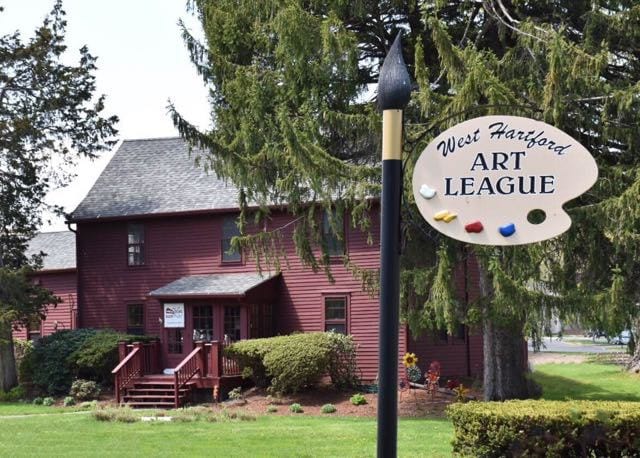
The home of the West Hartford Art League is part of the Buena Vista Historic District. This old farmhouse is currently the Saltbox Gallery. Photo credit: Deb Cohen (we-ha.com file photo)
“As an art school, we derive the majority of our income from art classes and summer camp. We’ve been closed since March 16. We had to cancel our spring class session, and we’re still waiting to see if it will affect our summer programs,” she said.
“When we realized we couldn’t offer classes that would normally have started April 6, we put together a small roster of online classes. We hope students will embrace this new method while we’re physically closed, and that it will help them stay involved, and take their mind off the quarantine. We also had to cancel our annual May 29 fundraiser, and postpone CT+6 – our biggest juried exhibit of the year, which we hold every spring. Both are part of our annual budget,” Stachelek said.
“We are losing a very large portion of income but we’re trying to adapt as best as we can right now. We have asked students to request a voucher for a future class if possible, instead of a refund but we understand not everyone is in a position to do that right now.” Stachelek said the West Hartford Art League has applied for a loan to cover payroll.
Spring is usually a busy time at the Noah Webster House & West Hartford Historical Society, which operates not only a museum but is also responsible for archiving the town’s history.
“For us, the timing of having to close our doors during the spring, when we usually see the greatest number of school visitors, has taken away a large amount of our income,” Matos said. The school programs have been canceled for the rest of the year, and the 12 museum educators – mostly retired teachers – are not employed. Because they are technically seasonal employees, they didn’t need to be furloughed; they just haven’t been assigned work.
“War of the Words,” the Noah Webster House’s signature spring fundraiser, has also been canceled, although Matos said they are exploring perhaps holding it virtually.
Matos said the museum has applied for the Paycheck Protection Program, but she hasn’t heard yet. Permanent staff are still employed and are keeping very busy, with most working from home on various research projects and putting together a new exhibit on West Hartford history that will be housed at Webster Walk at Blue Back Square.
“We’re also actively collecting history from this period,” Matos said. “We realize we don’t have much in our collection from the [Spanish flu pandemic] of 1918. I wish we did.”
Most of the assistance programs that have been developed thus far in response to COVID-19 don’t really help West Hartford’s arts and cultural organizations. Many have little, if any, collateral, and even if they qualify for loans such as through the Paycheck Protection Program, it can create a financial hardship when the time comes to repay those loans.
“They don’t fit neatly into these programs,” Coursey said, but the organizations are really important for what they add to the community.
“The quality and breadth of the arts and cultural institutions in our community are the envy of towns across the state,” said Chris Conway, executive director of the West Hartford Chamber of Commerce, who also sent a letter to legislators in support of their plea.
“The economic impact of these organizations reaches far beyond their venues. Research shows for every dollar spent on admissions or tickets, an additional three dollars is spent on things such as dining, shopping or lodging. Their survival in the wake of this crisis is key to the bigger picture of economic recovery,” Conway said.
“By all of us working together to request assistance, we hope our legislators will acknowledge how much all of our cultural organizations contribute to daily life in our community,” said Stachelek. “These are very unusual times, that require unusual support.”
“We absolutely need to help these organizations,” said State Sen. Derek Slap. “Not only are they an important part of our economy, but the arts are what many of us live for, what makes our community so special.”
While resources certainly need to be marshaled, Slap acknowledges that there’s not currently one clear path to help these organizations. He said he sees a three-part strategy: help accessing the resources that already exist on the state and federal level, advocate for these types of organizations to be more specifically included in additional federal measures that are expected, and then look for a state response to bridge any gaps.
“I expect our federal delegation to be sensitive to it,” Slap said. He said he plans to advocate on behalf of the arts and cultural organizations, and hopes the organizations and their supporters will do the same, approaching U.S. Sen. Richard Blumenthal and U.S. Sen. Chris Murphy and U.S. Rep. John Larson. Now is the time to do that.
Statewide, Slap said, while there has been some money set aside for small businesses, more help is needed. The problem is right now the legislature isn’t meeting, and with the session required to end by May 6, it’s unlikely they will be get together until a special session is set.
Slap said it’s important to pass some measures statewide to ensure that these organizations don’t fall through the cracks, “but we don’t know what that’s going to look like yet. … There needs to be more, that’s no question.” When the legislature does get together, he expects a COVID-19 response to be bipartisan.
“Where are we going to end up? That will depend on the new normal,” Flater said. “We can’t afford to run a show with 30 people in the theater.”
To continue to engage their supporters, Playhouse on Park Co-Founder/Co-Creative Director Darlene Zoller has been holding an online dance/exercise class daily at noon, and the Playhouse is hosting a virtual open mic, asking for YouTube videos to be submitted, among other activities.
“Right now it’s just distraction, to be there for people,” Flater said. There have also been some donations sent in, for which she is very appreciative.
“Even when we can re-open the world, will they come?” Flater said.
Dattellas said she wonders when BTC will be able to offer classes again.
“COVID-19 has changed the way we’ll operate for a while,” Stachelek said. “Our goal now is to come up with new ways to continue to offer our programs, and support artists, in a safe environment.”
The organizations that signed the letter are asking not to be forgotten. “They want to continue their mission in West Hartford,” Coursey said. “We want to make sure they are here when its over, that they can re-open for business.”
Ensuring that West Hartford’s arts and cultural organizations will survive – and thrive – once the crisis of this pandemic has passed is critical to maintaining the town’s vibrancy, Cantor said, and she hopes that some measure of aid or relief can be found to ensure that will happen.
“We are asking you, our elected officials, to fight for our small community arts and culture organizations as the state works to help small businesses during this crisis,” the letter states. “Grants to small community arts and culture organizations will help ensure that these cherished institutions will be able to continue to add the vitality of their communities once this crisis passes.”
“I don’t want to take anything attention away from what healthcare needs. There are people who don’t have food,” Flater said. “But when we come out there needs to be help for arts organizations.”
“I understand during this crisis that people are very concerned about health,” Matos said, as they should be. “But I hope the community, the state, the nation, still care about the arts.”
“If there’s any silver lining to this crisis, it will be getting the arts and cultural organizations to work as a team. I’m hopeful that this situation will get the arts organizations together,” said Dattellas.
“We’re going to keep thinking, keep meeting,” said Dattellas. “I hope we’ll figure it out.”
Arts and culture can help people heal, Matos said. “If we’re going to continue to be here, we need help to make sure we’re able to survive this and still be a resource.”
Like what you see here? Click here to subscribe to We-Ha’s newsletter so you’ll always be in the know about what’s happening in West Hartford! Click the blue button below to become a supporter of We-Ha.com and our efforts to continue producing quality journalism.
 Loading...
Loading... 

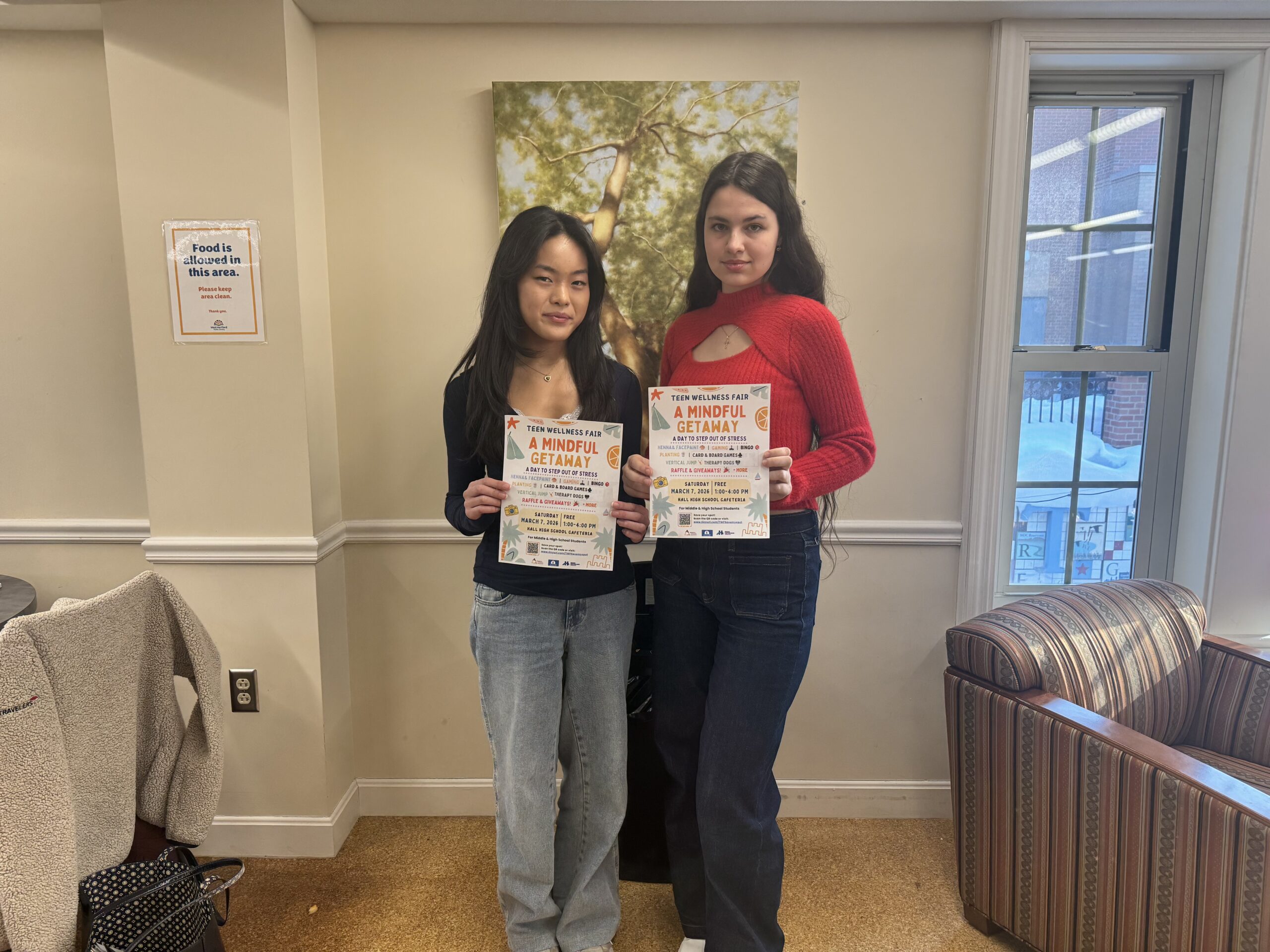
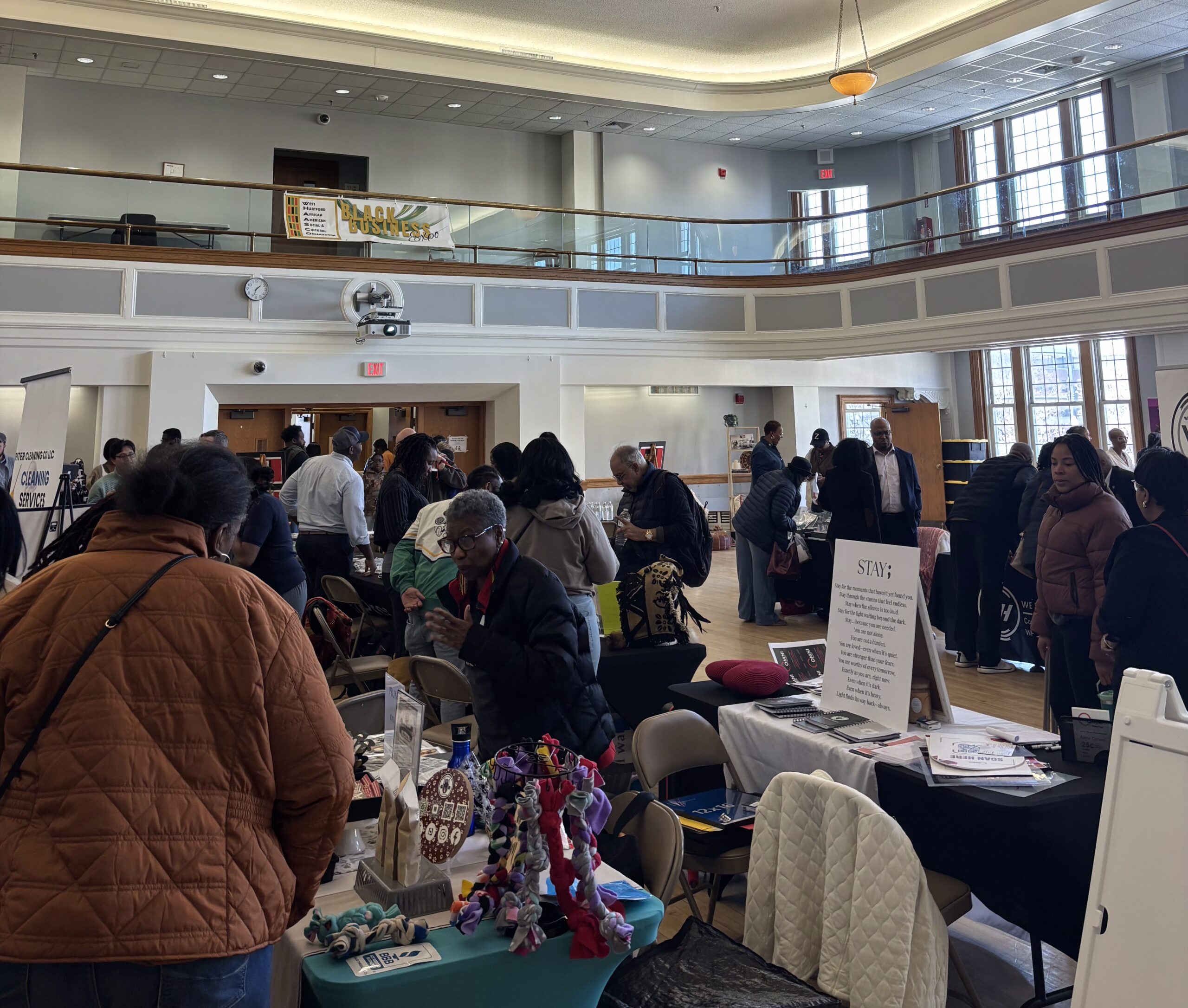
[…] thanked Chuck Coursey, a longtime supporter of arts and culture, for bringing together local organizations and helping them work together to lobby for support this sprin… as their traditional activities were forced to hit pause and couldn’t operate as usual. They […]